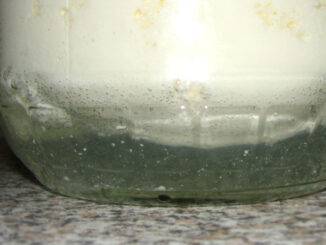
First, it is important to stress that all types of Kefir contain live bacteria and yeast, Milk and Water Kefir alike.
Therefore, if you still do not have experience with Kefir or any other probiotic food containing live microorganisms, it is good to take some precautions.
The first and most important rule is to start consuming Kefir carefully, gradually, and step by step, by testing the reactions of your body first.
If you have never taken Kefir before, its first intakes could put your stomach “in overdrive more”, causing symptoms like bloating, flatulence, or even diarrhea. Still, these symptoms usually fade away within days, once your stomach adapts to the new, powerful food.
So, begin with a spoonful of Kefir a day, then increase the dose to two spoons. If everything is fine, try a teacup, then two.
The optimal daily dose of Milk Kefir for healthy individuals is around 0.5 liter, up to 1 liter a day (17 up to 34 oz). Still, for healthy persons, there is nothing like a “Kefir overdose”. Unless you have a specific health condition that makes you hypersensitive to Kefir or any of its ingredients, there is no quantity of Kefir that could cause any harm to you.
There is not enough scientific information to determine the “best” dosage of kefir. Your appropriate dose of kefir depends on several factors, such as your age, health, and several other conditions.
While, as we said, normally Kefir cannot cause any harm and there is nothing like a “Kefir overdose”, Kefir is a powerful probiotic food that should be taken with the appropriate care. Not all natural products are necessarily safe for everyone, and an individual approach to dosage is recommended, especially at its first use.
Women should take some precautions during the periods of pregnancy and breastfeeding. While Kefir is considered perfectly safe for pregnant and breastfeeding mums, it is a good idea to read more details in our articles “Kefir during pregnancy” and “Kefir while breastfeeding“.
Milk Kefir is regarded as safe for kids between the ages of 1 and 5 years, but only for no longer than 10 days in a row. Kefir is considered perfectly safe with no restrictions for more than 5 years old kids.
Immune system precautions
All types of Kefir are potent immune system modulators! Kefir is known to balance and harmonize the human immune system, which is precisely what most people usually are expecting from kefir.
However, some diseases called autoimmune diseases are due to “overreactions” of the immune system, and consumption of Kefir by people with autoimmune diseases may lead to a risk of aggravating the symptoms of their conditions.
In case you are diagnosed with an autoimmune disease, please consult your physician before taking any powerful probiotic, including Kefir.
In AIDS and other conditions that weaken the immune system, Kefir may be a concern.
Milk Kefir contains active bacteria and yeast, and there is some concern that people with a weakened immune system might be more prone to infections from these bacteria and yeast.
In people undergoing chemotherapy for colon cancer, kefir might increase side effects such as stomach and intestinal problems, mouth sores, drowsiness, sweats, and hair loss.
Patients should take special precautions when taking medications that suppress the immune system (Immunosuppressants).
The first reason is that Kefir acts as an immunomodulator that can interfere with and inhibit the effects of immunosuppressants.
Secondly, as Kefir contains live bacteria and yeast, it is suitable for healthy people with a stable immune system. Medications suppressing the immune system can increase your chances of getting infections caused by an overgrowth of the bacteria and yeast of Kefir.



